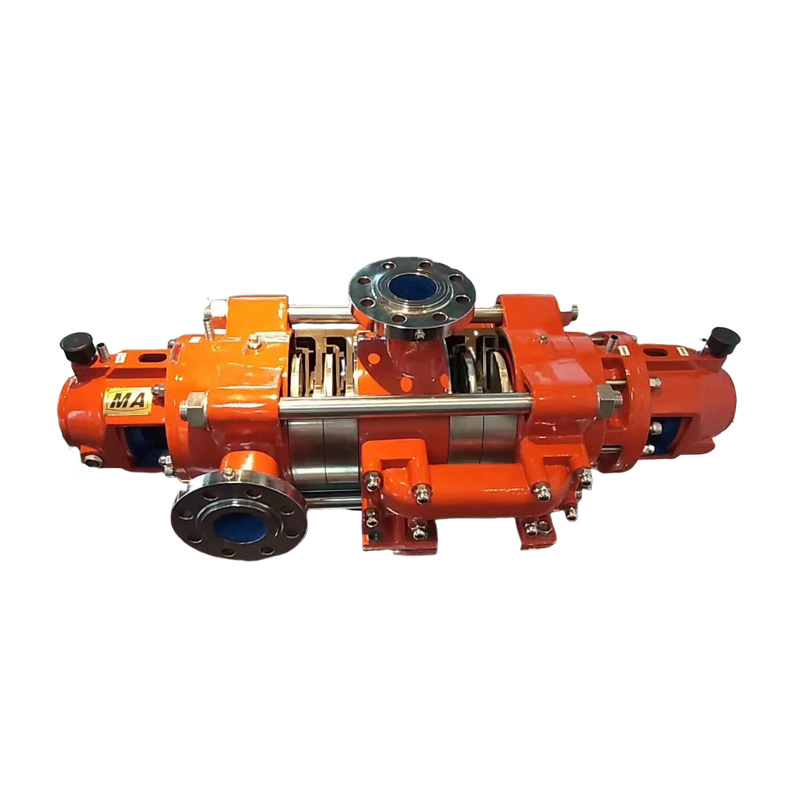Understanding the Benefits and Applications of Multistage Pumps in Industrial Settings
Jun 04,2025

Multistage pumps are essential components in many industrial applications, providing an efficient solution for transporting fluids across various systems. These pumps are designed to handle a variety of fluids and are particularly ideal for situations where high pressure and flow rates are required. Below, we delve into their features, advantages, and applications in the industrial sector.
**What is a Multistage Pump?**
A multistage pump consists of multiple impellers (or stages) that work in tandem to increase the pressure of the fluid being pumped. Each impeller contributes to the overall pressure increase, making these pumps capable of delivering fluids to significant heights or over long distances. The design typically includes a series of stages, each with its own impeller and diffuser, which allows for the efficient conversion of energy into pressure.
**Advantages of Multistage Pumps**
1. **High Efficiency**: One of the most significant advantages is their efficiency. Multistage pumps can achieve higher pressures compared to single-stage pumps, making them suitable for applications that demand both high flow rates and pressures.
2. **Versatility**: These pumps can handle various fluids, including water, chemicals, and even slurries, making them versatile for different industrial applications. Their ability to accommodate different fluid properties expands their usability.
3. **Space-Saving Design**: The compact design of multistage pumps allows them to be installed in areas with limited space, offering a practical solution for many industrial setups.
4. **Reduced Maintenance Costs**: With fewer moving parts compared to larger, single-stage pumps, multistage pumps generally require less maintenance, reducing long-term operational costs.
**Applications in Industrial Settings**
Multistage pumps are widely used in various industries, including:
- **Water Treatment**: They are often employed in water supply systems, helping to transport water from treatment facilities to distribution systems.
- **Chemical Processing**: In chemical manufacturing, multistage pumps can handle corrosive and viscous fluids, providing reliable service in demanding environments.
- **Power Generation**: These pumps are crucial in power plants for cooling and boiler feed applications, ensuring efficient operation under high-pressure conditions.
- **Oil and Gas**: In the oil and gas industry, multistage pumps are used for transferring crude oil and other products, especially in enhanced oil recovery processes.
In conclusion, multistage pumps serve a vital role in the industrial equipment sector by providing efficient and reliable fluid handling solutions. Their ability to operate under high pressure and adapt to various fluid types makes them indispensable in numerous applications. Understanding their features and functionalities will help professionals select the right pump for their specific needs, ultimately optimizing their system performance and productivity.
**What is a Multistage Pump?**
A multistage pump consists of multiple impellers (or stages) that work in tandem to increase the pressure of the fluid being pumped. Each impeller contributes to the overall pressure increase, making these pumps capable of delivering fluids to significant heights or over long distances. The design typically includes a series of stages, each with its own impeller and diffuser, which allows for the efficient conversion of energy into pressure.
**Advantages of Multistage Pumps**
1. **High Efficiency**: One of the most significant advantages is their efficiency. Multistage pumps can achieve higher pressures compared to single-stage pumps, making them suitable for applications that demand both high flow rates and pressures.
2. **Versatility**: These pumps can handle various fluids, including water, chemicals, and even slurries, making them versatile for different industrial applications. Their ability to accommodate different fluid properties expands their usability.
3. **Space-Saving Design**: The compact design of multistage pumps allows them to be installed in areas with limited space, offering a practical solution for many industrial setups.
4. **Reduced Maintenance Costs**: With fewer moving parts compared to larger, single-stage pumps, multistage pumps generally require less maintenance, reducing long-term operational costs.
**Applications in Industrial Settings**
Multistage pumps are widely used in various industries, including:
- **Water Treatment**: They are often employed in water supply systems, helping to transport water from treatment facilities to distribution systems.
- **Chemical Processing**: In chemical manufacturing, multistage pumps can handle corrosive and viscous fluids, providing reliable service in demanding environments.
- **Power Generation**: These pumps are crucial in power plants for cooling and boiler feed applications, ensuring efficient operation under high-pressure conditions.
- **Oil and Gas**: In the oil and gas industry, multistage pumps are used for transferring crude oil and other products, especially in enhanced oil recovery processes.
In conclusion, multistage pumps serve a vital role in the industrial equipment sector by providing efficient and reliable fluid handling solutions. Their ability to operate under high pressure and adapt to various fluid types makes them indispensable in numerous applications. Understanding their features and functionalities will help professionals select the right pump for their specific needs, ultimately optimizing their system performance and productivity.
Contact Us
E-mail :
liu@cnpumpmade.com
WhatsApp:
+8615028256698
Address:
Nanyang Industrial Park, Shifo Town, Anguo City, Hebei Province, China







